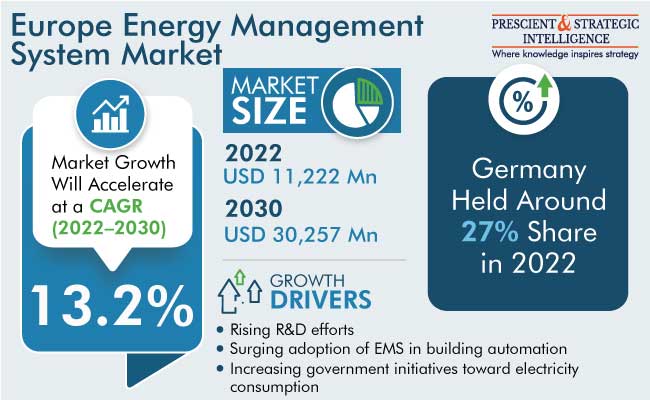Europe Energy Management System Market is Dominated by Germany
The Europe energy management system market is projected reach USD 30,257 million by 2030, growing at a CAGR of 13.20%.
Factors driving this growth include electricity price volatility, strict government policies & regulations, and the increasing adoption of energy management systems in building automation.
Additionally, the market is benefiting from surging economic growth, rapid industrialization, and government initiatives aimed at promoting efficient electricity consumption.
The service category is the dominating the market, contributing the largest share of revenue. This is driven by the growing demand from end users to reduce operational costs through various services such as maintenance, consulting & training and monitoring & control.
Within the service category, monitoring & control services hold the largest share. Continuous monitoring and control are essential for the efficient operation of EMS components. Supervisory systems like SCADA are utilized in smart grids to monitor and control energy consumption. The adoption of such technologies to minimize energy usage is on the rise in Europe, further fueling the growth of this category
The software category is projected to experience the highest CAGR of approximately 14% in the coming years. Companies are increasingly investing in software for EMS to reduce power costs, improve system efficiency and analyze performance. The residential sector in Europe offers significant potential for smart energy devices, with a focus on in-house display devices. Utility software is the dominant segment within the software category, providing benefits such as cost allocation and benchmark building efficiency.
In 2022, Germany dominated the Europe energy management system market with a 27% revenue share. The country is expected to grow significantly due to government measures promoting energy conservation and growing awareness regarding climate change. Germany government has set ambitious goals, including achieving 100% renewable energy usage by 2035 and phasing out coal by 2038.
While the previous target for 100% renewable electricity has been adjusted due to the Russia-Ukraine war, Germany aims to have approximately 80% of its electricity generated from renewable sources by 2035.
EMS are widely used in industrial applications, and this segment is expected to continue leading the European market. EMS plays a crucial role in managing the substantial power consumption of industries such as steel, refinery, cement, chemical, and petrochemical. EMS implementation helps in reducing carbon footprint and production costs, leading to increased profitability for these industries. Industrial applications remain a key driver for EMS adoption in Europe, providing environmental and financial benefits.
The growing awareness and demand for energy-efficient solutions, coupled with government support and industry trends, are driving the adoption of EMS in Europe, providing both environmental and financial benefits to various sectors.
It is because of the increasing efforts pertaining to research and developments, happening, the demand for energy management solutions will continue to grow in the years to come
Read More: https://www.psmarketresearch.c....om/market-analysis/e



North America was the Leader of the Data Center Market
The data center market will power at a double- digit compound annual growth rate by the end of this decade, to reach USD 602.76 billion by 2030, as stated by a market research institution, P&S Intelligence.
The exponential surge in data is the key factor contributing to the growth of the industry. Consequently, the requirement for these centers is mushrooming because of the expanding necessity for mobile, social, analytics, and cloud services all over the world.
The recent boom in the use of social media has enhanced the structuring of new centers, for storing the data.
IT infra is the largest revenue contributor, as it includes storage, server, and network infra, the backbone of these kinds of facilities. The requirement for it will grow even more in the future with about 11.4% rate, permitting it to uphold its position.
At the time of the pandemic, cloud acceptance is quickening at a fast pace. The IT industry has been colocating to hyperscale data centers, to allow improved data management, having understood the importance of what can be done with the help of data.
Colocation has helped the organizations globally regarding their IT infra requirements. Understanding the necessity for an efficient center to decrease barriers for clienteles and for higher profit margins, improved storage of data and management, advanced security, and dependability, IT corporations are moving in the direction of hyperscale data centers.
IT and telecom sector are the dominated the data center market. With the swift acceptance of trailblazing technologies, for example cloud, IoT, and AI, generation of data is ballooning. This data comes from mobile internet use, network equipment, server logs, personnel records, billing actions, and social networks.
For storing such huge data, IT and telecom corporations are renting space at these third-party facilities. With these, IT and telecom companies can store huge amounts of data and raise or decrease the capacity of storage as required.
North America had the largest share in the industry, and it will continue like this in the years to come as well, with USD 191.80 billion.
The U.S. is the leader of the pack, and it will grow at a rate of 8.4%, because of the existence of quite a few data centers.
There are more than 2,600 such centers in the U.S., many of which are in northern California, where there are a number of IT firms, for example Google, Uber, Facebook, Yelp, and Twitter, are headquartered. The region also has cutting-edge, widespread, and efficient tech infra.
The exponential surge of data around the world has led to an increased demand for data centers.
Read More: https://www.psmarketresearch.c....om/market-analysis/d
What Kind of Things Can Be Made With 3D Printers?
3D printing is a procedure in which a digital prototype is turned into a solid, tangible, three-dimensional object, typically by placing down numerous successive, thin coatings of a material. 3D printing has gained traction so rapidly because it aids manufacturing available to more individuals than ever before. This is partially because of the cost but also the compact size of the printers compared to outdated manufacturing.
The 3D printing market is experiencing growth and is projected to reach USD 77,228 million by 2030.
How does 3D Printing work?
First, a computer-generated design of the thing is created. This design will function as a
blueprint for the 3D printer to study. The virtual model is built utilizing computer-aided design software, a kind of software that can make exact sketches and technical illustrations. A computer-generated design can also be made utilizing a 3D scanner, which makes a copy of a present object by essentially taking images of it from different angles.
Once the virtual design is created, it should be ready for printing. This is completed by breaking down the design into numerous layers using a procedure known as slicing. Slicing takes the prototypical and slices it into hundreds or even thousands of thin, flat layers utilizing special software.
After the model has been divided, the slices are set to be uploaded to the printer. This is completed using a USB cable or Wi-Fi connection to transfer the sliced design from the computer it’s on to the 3D printer. When the folder is uploaded to the 3D printer, it studies each slice of the model and prints it layer by layer.
What Kind of Things Can Be Made With 3D Printers?
Almost whatever you can think can be twisted into a model that can be 3D printed. 3D printers are supporting engineers, designers, and even ordinary individuals who can make difficult objects in ways preceding manufacturing approaches weren’t capable of.
3D printers are being utilized to make tools, toys, phone cases, tables, clothing, pottery, lamps, art, and even cars.
The medicinal field is also discovering new methods to utilize 3D printing to aid patients. Medics are now capable to print 3D medical replicas that are so precise that doctors can do a practice carry on a patient’s 3D model previously essentially functioning on that patient. 3D printed models are also being utilized to create more durable, less costly, and ****ter-fitting prosthetics for people who have lost limbs.
3D printed making is a rapidly developing sector with a lot of electrifying potential for the future. We’ve only just initiated to see the conducts 3D printed things can make our lives more convenient, easier, healthier, and safer.
And with 3D printing growing as rapidly as individuals can come up with new projects to print, it might not be long before we live in a globe where you can 3D print your tiffin, a routine fitted shirt, or spare parts to restore ordinary objects—all from the ease of your own house.
Read More: https://www.psmarketresearch.c....om/market-analysis/3
Microcontrollers, Making Your Favorite Gadgets Function with Ease
If we say technology is omnipresent then, we are in a way stating the truth about the scenario of today. Out of the many technologies present before us, microcontrollers are becoming increasingly popular day by day. It is due to the increasing popularity of these devices, the total global demand for microcontrollers will reach to a value of $43.61 billion by 2030.
Microcontrollers are used in almost every gadget of the contemporary world. These micro-ICs help us to make the world efficient and smart at the same time.
The dynamics of the gadget does not matter as such, as microcontrollers can be programmed into any kind of gadgets.
Low-cost wearables, high-end consumer electronics, medical equipment military and aerospace systems along with in high-end consumer goods, and industrial devices, all make use of microcontrollers. The applications of these devices are too much to be counted on fingers. If, as an engineer, you want to upgrade the armory repertoire then you must be to be expert in microcontroller-based circuit design.
Microcontrollers And Microprocessors, Similar in Function But Different
Even though microcontrollers and microprocessors function as highly integrated computer systems, they are still a bit different from each other. Usually, the term ‘processor’ refers to a system having CPU and memory.
Microprocessor is an IC, with a CPU, capable of decision-making abilities and computing. When it is connected with other ICs providing storage for input/output data and programs, the formed network becomes the heart of a small computer.
Microprocessors are also extremely useful; a microprocessor alone cannot be termed as a complete system. You need various other peripherals and components required to be connected to the microprocessor. When a microprocessor is acquired along with other peripherals for example ROM and RAM, output and input ports on a single IC is called as microcontroller.
Why Microcontrollers Are Getting Popular?
Microcontrollers are not as expensive as microprocessors, as they come in handy for reducing the size, cost, and intricacy of the system. A lot of the automated products and devices going around the world are embedded systems based on microcontrollers, such as gadgets and devices, home appliances, , flight control systems, automobile engines, traffic lights, etc.
Microcontrollers signify the middle ground for controllers and engineers. There should not only be a good knowledge of programming for the creation of appropriate firmware but also necessitate a knowledge of electronics for interacting with the program in the microcontroller. ICs, per se, concern both the hardware and software characteristics of engineering.
Which Device Has Got a Microcontroller Embedded in It?
There are a lot of use of ICs and the related embedded systems design or advanced digital design in various industries such as healthcare, Defense and aerospace, industrial, telecom, consumer electronics.
All in all, we can say that any device having microchip embedded as a part of its working module, has a microcontroller in it regulating all of its basic and advanced functions.
Read More: https://www.psmarketresearch.c....om/market-analysis/m
Virtual Fitting Room Market To Generate Over $18,000.0 Million Revenue by 2030
The global virtual fitting room market revenue stood at $3,128.6 million in 2019, and it is predicted to rise to $19,250.4 million by 2030. Furthermore, the market will progress at a CAGR of 18.5% from 2020 to 2030 (forecast period), as per the estimates of the market research company, P&S Intelligence. The market is being driven by the growing popularity of online shopping, increasing penetration of smartphones, and soaring use of advanced technologies by retailers to expand their customer pool.
With the rising penetration of the internet, the e-commerce industry is exhibiting huge expansion. As per the World Bank, around 49.0% of the total population across the world had access to the internet in 2017. Furthermore, as per the observations of the United Nations Conference on Trade and Development (UNCTAD), in 2018, online sales generated a revenue of $25.6 trillion, which was 8% higher than the number reported in 2017.
The organization also reported that that the revenue generated by e-commerce sales, including business-to-business (B2 and business-to-consumer (B2C) sales, was around 30% of the year’s global gross domestic product (GDP). Additionally, 1.45 billion customers, which accounted for nearly one-quarter of the global population aged 15 and older, bought services/products online in 2018, registering an increment of around 9% from the total number of online shoppers in 2017. Out of all countries, the highest number of these shoppers (610 million) resided in China.
Apart from the increasing internet penetration, the mushrooming population of smartphone users across the world is also responsible for the expansion of the e-commerce industry, which is, in turn, fueling the growth of the virtual fitting room market. Depending on application, the market is divided into eyewear, beauty and cosmetics, apparel, jewelry and watches, and footwear. Out of these, the apparel category dominated the market in 2019. This is ascribed to the fact that there are numerous shoppers who buy apparel via e-commerce platforms. However, the product return rate is quite high, on account of the unavailability of product trials and size issues.
Owing to this reason, retailers are increasingly adopting virtual fitting room solutions, as these solutions enable them to provide an improved shopping experience to customers and reduce the return rate of products. Geographically, North America contributed the highest revenue to the virtual fitting room market in 2019. This is credited to the large-scale use of advanced technologies, such as virtual reality (VR) and augmented reality (AR), in the U.S. Currently, AR solutions are offering in-store navigation, which is assisting customers in finding products easily via apps.
On the other hand, the Asia-Pacific (APAC) region is predicted to be the fastest growing region in the virtual fitting room market during the forecast period. This is attributed to the increasing digitization rate in the retail industry and the growing adoption of digital retailing solutions by customers in the region. Additionally, regional countries, such as Japan and China are home to a large online shopper base. Hence, the increasing penetration of e-commerce and mushrooming number of smartphone users are boosting the need for virtual fitting rooms in the region.
Hence, it is safe to say that the market will register considerable growth in the coming years, primarily because of the surge in the e-commerce industry, owing to the rising penetration of the internet, increasing number of smartphone users, and soaring popularity of online shopping all over the world.
Read More: https://www.psmarketresearch.c....om/market-analysis/v











